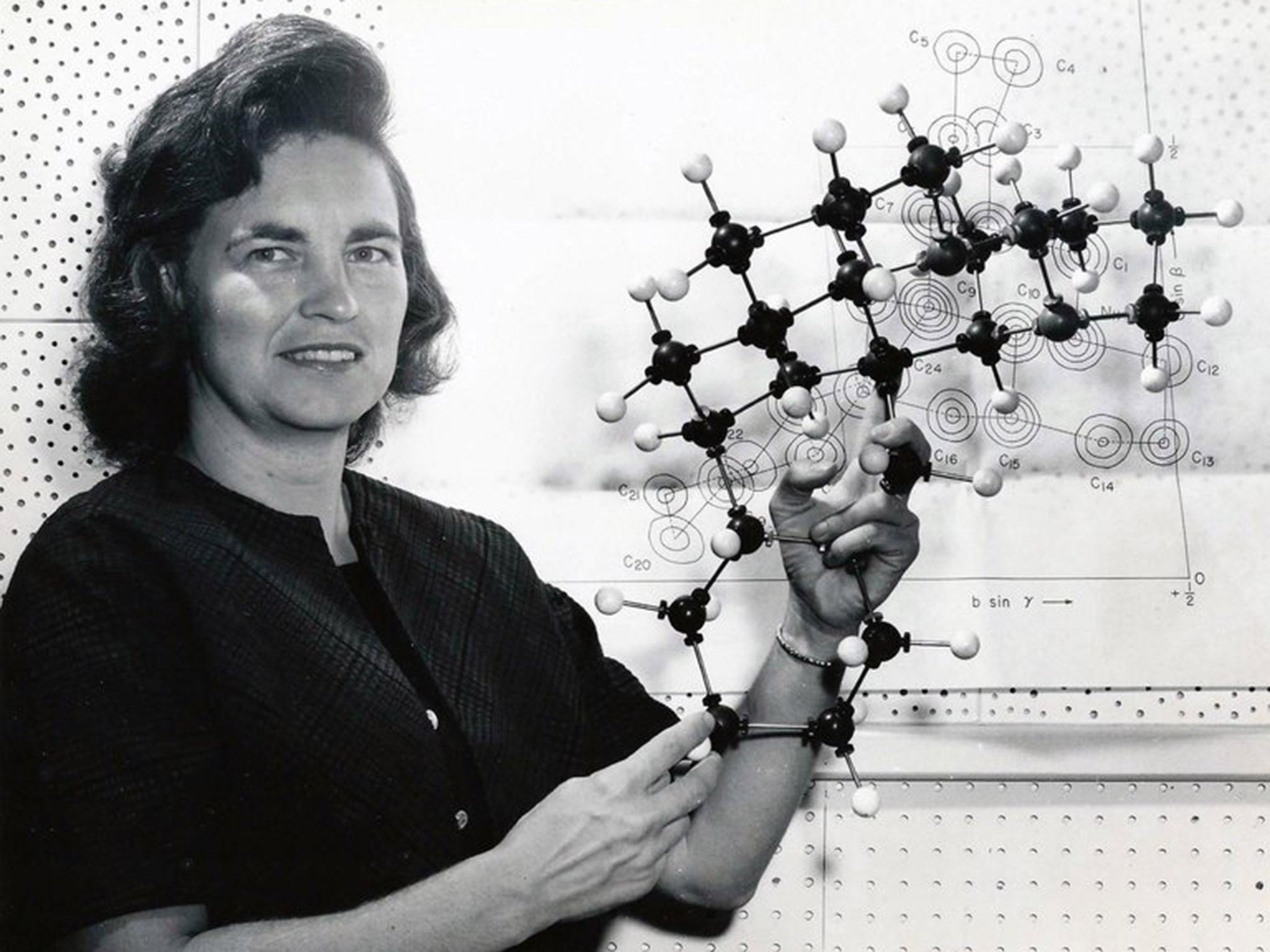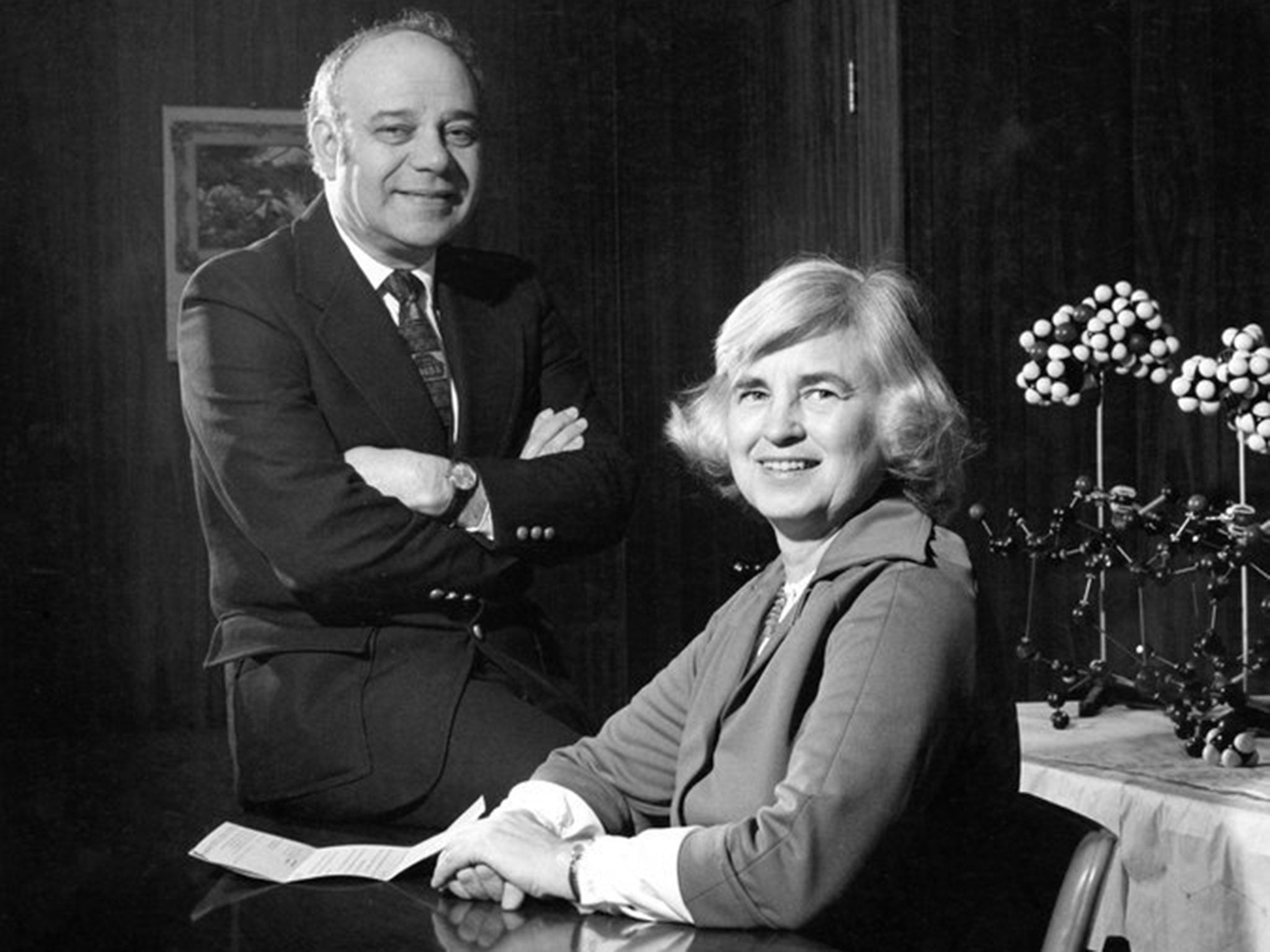Isabella Karle: Chemist who revealed molecular structures and helped husband win Nobel prize
Inspired by a biography of Marie Curie as a child, the daughter of Polish immigrants to the US conducted pioneering work on everything from anticarcinogens to explosives, alongside her husband Jerome

Your support helps us to tell the story
From reproductive rights to climate change to Big Tech, The Independent is on the ground when the story is developing. Whether it's investigating the financials of Elon Musk's pro-Trump PAC or producing our latest documentary, 'The A Word', which shines a light on the American women fighting for reproductive rights, we know how important it is to parse out the facts from the messaging.
At such a critical moment in US history, we need reporters on the ground. Your donation allows us to keep sending journalists to speak to both sides of the story.
The Independent is trusted by Americans across the entire political spectrum. And unlike many other quality news outlets, we choose not to lock Americans out of our reporting and analysis with paywalls. We believe quality journalism should be available to everyone, paid for by those who can afford it.
Your support makes all the difference.Isabella L Karle, who has died aged 95, was once told that chemistry was not a “proper field for girls” – but went on to help her husband, Nobel laureate Jerome Karle, devise a groundbreaking method for determining molecular structure.
Karle and her husband spent more than six decades at a US Naval Research Laboratory (NRL) in Washington state.
In 1985, Jerome Karle shared the Nobel Prize in chemistry with the mathematician Herbert Hauptman, also a colleague at the laboratory. They were lauded for “their outstanding achievements in the development of direct methods for the determination of crystal structures”.
Isabella Karle, a crystallographer, received the National Medal of Science in 1995, bestowed by President Bill Clinton, among other major honours in her field.
The Karles worked side by side at the NRL's Laboratory for the Structure of Matter, accumulating a combined 127 years of federal service. “I do the physical applications, he works with the theoretical,” she once said. “It makes a good team. Science requires both types.”
Before the prize-winning work that the Karles pursued with Hauptman in the 1950s, scientists could only discern molecular structure through the time-consuming and painstaking process of X-ray crystallography, in which X-rays were reflected off a molecule and their patterns then examined.
The Karles' “direct method” permitted scientists to use mathematics to discover molecular structure via a less circuitous route, saving time and gaining precision.
For many years, the method languished, unnoticed by other scientists. “It was Isabella's work that drew attention to its usefulness,” according to a tribute to the couple by the NRL, which credited her with preparing the way for “the analysis and publication of the molecular structures of many thousands of complicated molecules annually”.
Among those molecules were toxins and antitoxins (drugs to treat bacterial infections, malaria and heart ailments), anticarcinogens and explosives.

“It is almost impossible to give an example in the field of chemistry where this method is not being used,” a judge for the Nobel Prize remarked when Jerome Karle's award was announced.
Isabella Helen Lugoski was born in Detroit, Michigan. Her father painted the numbers and letters on city trams, and her mother ran a restaurant and sewed automobile upholstery for Detroit carmakers.
In her youth, she drew inspiration, her daughter said, from a female high school chemistry teacher and from a biography of Marie Curie, the Nobel Prize-winning physicist who, like Karle's parents, was born in what is now Poland.
Karle's career required her to overcome the discouragement of another teacher, she once told an interviewer; this teacher advised her on the impropriety of chemistry as a topic of study for young women.
She went on to study chemistry at the University of Michigan, receiving a bachelor's degree in 1941, a master's degree in 1942 and a PhD in 1944. She met her husband in a physical-chemistry lab where alphabetical seating dictated that the two of them – Karle, Lugoski – would sit next to one another.
After working on the Manhattan Project during the Second World War, Karle joined the Naval Research Laboratory in 1946, two years after her husband was hired there. Early in her career, she studied molecules in the vapour state. Both Karles retired in 2009.
Isabella Karle's distinctions include the 1988 Gregori Aminoff Prize from the Royal Swedish Academy of Sciences, the 1993 Bower Award and Prize for Achievement in Science (worth £250,000), and the Navy Distinguished Civilian Service Award. She was a member of the National Academy of Sciences.
Her husband died in 2013 after 71 years of marriage. Survivors include their three daughters, who are all scientists – Louise Karle Hanson of Ridge, New York, Jean Karle Dean of Vienna, Virginia, and Madeleine Karle Tawney of Lake Barcroft – as well as four grandchildren and a great-granddaughter.
When Jerome Karle received the Nobel, he said he hoped the honour would one day be extended also to Isabella.
“I can't think of anyone,” he told the Associated Press, “who is more qualified than my wife.”
Isabella Karle, scientist, born 2 December 1921, died 3 October 2017
© The Washington Post
Subscribe to Independent Premium to bookmark this article
Want to bookmark your favourite articles and stories to read or reference later? Start your Independent Premium subscription today.
Join our commenting forum
Join thought-provoking conversations, follow other Independent readers and see their replies
Comments